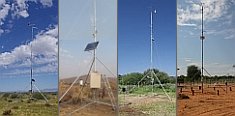Workpackages of Subproject S11
Workpackage WP11.1
Prof. Dr. Hartmut Lang, University of Hamburg, Institute of Social Anthropology, Rothenbaumchaussee 67/69, 20148 Hamburg, Germany
Hartmut.Lang@uni-hamburg.de
Biodiversity management and the cultural dimension
Short description: The aim of this work package is to identify and describe those cultural factors that have an impact on the biodiversity of the observatories, and to assemble and adapt to the local conditions an array of standardized data collection and analysis tools for monitoring these factors. The units of investigation are actors who make use of the areas surrounding the observatories studied. There will be four fields of investigation: Social networks, Cognition, Behaviour and Demography.
Workpackage WP11.2
Judith Hecht, Department of Agricultural and Environmental Policy Analysis, Justus-Liebig-Universität, Senckenbergstr.3, 35390 Giessen, Germany
Judith.Hecht@agrar.uni-giessen.de
M.Sc. Ibo Zimmermann, Department of Agriculture, Polytechnic of Namibia,
Private Bag 13388, Windhoek, Republic of Namibia
ibozim@polytechnic.edu.na
Modelling of decision making and bio-economic dynamics in
communal lands
Short description: The aim of this work package is to analyse management practices in livestock rearing in communal areas of Namibia by using a bio-economic model. Furthermore, the management of biodiversity in human used areas is intended to be monitored. The basic element of the model, the objective function, which reflects the interests of the involved actors, is meant to encompass risk behaviour. The biological component is supposed to be implemented in cooperation with other subprojects (9, 6, 2, 1).
Workpackage WP11.3
Marla Naidoo, Department of Agriculture, University of Zululand,
Privat Bag X1001, KwaDlangezwa, 3886 South Africa Bag X17
mnaidoo@pan.uzulu.ac.za
Farming systems and innovations
Short description: This work package aims at a deeper understanding of the short- and long-term management practices of communities in order to find measures to improve the system.
A combined research on livelihood strategies and herding practices is intended. The aim is to find local priorities for interventions with respect to herding strategies, temporary exclosures, minimal grazing, etc. and to quantify the impact on farmers' livelihood as well as on the preservation of nature.
Workpackage WP11.4
Bj°rn Vollan, Philipps-University Marburg, Department of Economics,
Institute for Co-operation in Developing Countries, Am Plan 2, 35032 Marburg, Germany
vollan@wiwi.uni-marburg.de
Prof. Dr. Manfred O. Hinz, University of Namibia, Faculty of Law, Private Bag 13301,
340 Mandume Ndemufayo Road, Pionierspark, Windhoek
lawfac@unam.na
Modelling institutional change, indigenous knowledge generation, and collective action in communal systems
Short description: The aim of this work package is to identify circumstances under which the community implements a sustainable natural resource management system, while trying to escape the "tragedy of the commons". It is argued, that awareness, local knowledge over the resource, social capital, and cost-benefit relationships influence the participation in collective actions among communities and hence may lead to institutional changes in the natural resource management process.
Workpackage WP11.5
Prof. Dr. Ernst-August Nuppenau, Department for Agricultural and Environmental Policy Analysis, Justus-Liebig-Universität, Senckenbergstr. 3, 35390 Giessen, Germany
Ernst-August.Nuppenau@agrar.uni-giessen.de
Internal valuation of environmental services and concepts for resilience
Short description: It is intended to estimate the value of non-market resources or ecological functions in terms of changes in economic activity by modelling the physical contribution of the resource or function to economic output. Therefore, several management options will be integrated into a modelling framework and it is intended to design more resilient resource use systems that satisfy immediate human needs, income aspirations, and needs for conservation.
Workpackage WP11.6
Bernadette Bock, Philipps-University, Department of Economics,
Institute for Co-operation in Developing Countries, Am Plan 2, 35032 Marburg, Germany
bock@wiwi.uni-marburg.de
Dr. Wolfgang Werner, The Desert Research Foundation of Namibia,
7 Rossini Street, Po Box 202 32, Windhoek West
wwerner@iway.na
Biodiversity-related policy analysis in Namibia and South-Africa
Short description: Work will concentrate on the determination and comparison of policy effects on micro level welfare and natural resource use forms and intensities, with prevalent differential tenure systems as basis for the comparison. Ultimate goal is to compare different policy instrument classifications (command-and-control-, market-based-, institutional instruments) in terms of efficiency and equity. Political economic aspects of policy choice, formulation and implementation form part of the core investigation.
|






 Go to the WeatherNet
Go to the WeatherNet